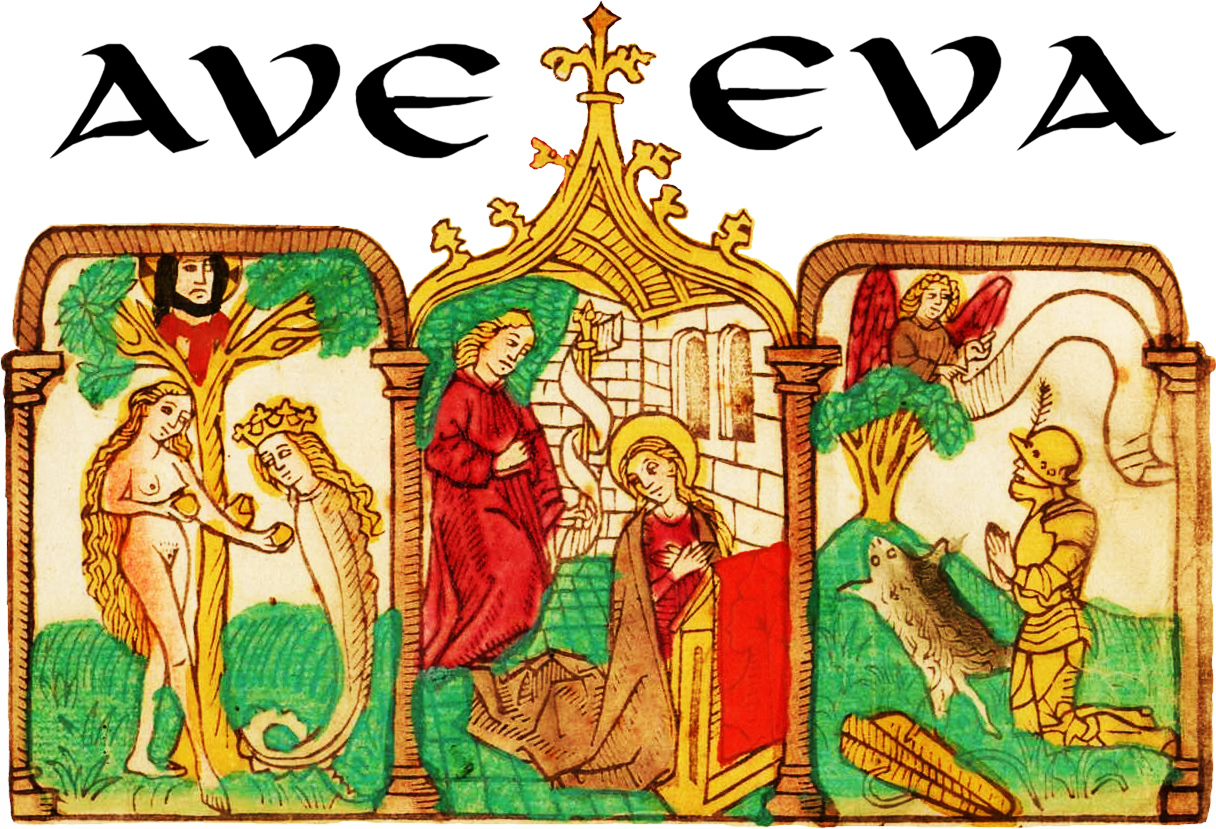
| [Tre bilder av samma sak, prefiguration, eller tre saker av samma typ, typologi: Syndafallet, Marie bebådelse och Gideons ull (Dom. 6:37-38), enligt Biblia Pauperum, en senmedeltida tolkningsanvisning till Bibeln] | [Three images of the same thing, a prefiguration, or three things of the same type, a typology: The fall of man, the annunciation and Gideon's wool (Judges 6:37-38), according to Biblia Pauperum, a late medieval guide to the interpretation of the Bible] |
| [Det svarta håret och skägget på Gud i första serierutan är ditmålat av en sentida revisionist. Gud hade i originalet långt blont hår och var betydligt mer lik änglarna i andra och tredje rutan. Man kan också lägga märke till att Gud - i motsats till hur det gestaltas i Bibeln - övervakar, och kanske rent av styr hela skeendet. Mer om detta senare.] | [The black hair and beard on God in the first panel is added by a later day revisionist. God had originally long blond hair and was much more similar to the angels in the second and third panel. You can also note that God - as opposed to how the story is described in the Bible - is supervising, and maybe even conducting the whole event. More on this later.] |
|
Gregoriansk och medeltida sång med Pisces Dei Lördagen den 31:a juli 2010 kl 13 Söndagen den 1:a augusti 2010 kl 13 i Riddarholmskyrkan i Stockholm |
Gregorian and medieval song with Pisces Dei Saturday 31 July 2010, 13 o'clock Sunday 1 August 2010, 13 o'clock in the Riddarholmen church in Stockholm |
| Det som följer här, är kanske inte så mycket en konsert, som ett föredrag med ljudbilder, där föredraget är detta som ni har i handen, och ljudbilderna, det är vi som sjunger. | What follows here, is not so much a concert, as a lecture with sound illustrations, where the lecture is this what you have in your hand, and the sound illustrations are us singing. |
| Vi ska nämligen berätta en medeltida historia för er, och vi ska berätta den på latin, eftersom det var så man gjorde på den tiden. Det är historien om människans skapelse och fall i Första Mosebok, och historien om hur denna berättelse speglas i evangelierna. | We are going to tell you a medieval story, and we are going to tell it in latin, because that was how it was done in those days. It is the story of man's creation and fall in Genesis, and the story of how this narrative was mirrored in the gospels. |
| Den sjätte dagen skapas människan, och så är skapelseveckans arbete avslutat, och vi är framme i nutiden. Men människans skapelse är inte färdig förrän den fått sin fullbordan i historien om Jesus, där skapelsen spegelvänds. | On the sixth day man is created, and the work of the creation week is finished, and we have reached our present times. But the creation of man is not complete until it has reached its consummation in the story of Jesus, where the creation is mirrored. |
| I denna historia är det Eva som är Maria, så när Gabriel säger Ave, “Var hälsad”, till Maria, så är det “Eva” baklänges. Adam är Jesus, och Jesus skapas av Marias kött på samma sätt som Eva av Adams. Korset han fästs på är Kunskapens träd i Paradiset, och själv är han frukten från Livets träd. Adams fall motsvarar Kristi uppståndelse. | In this story, Eva is virgin Mary, so when the angel Gabriel says Ave, “Greetings”, to Mary, it is “Eva” backwards. Adam is Jesus, and Jesus is made from Mary's flesh in the same way as Eva from Adam's. The cross he is crucified on, is the Tree of Knowledge in paradise, and he himself is the fruit from the Tree of Life. Adam's fall corresponds to the surrection of Christ. |
| Det är en historia med sorglig början och lyckligt slut, som återfinns lite här och där i olika liturgier runt kyrkoåret, och som vi ska försöka samla ihop fragmenten av och berätta i ett slags tematisk ordning. | It is a story with a sad beginning and a happy ending, which is found here and there in different liturgies around the church year, and we shall try to collect the fragments of it and present it in a sort of thematical order. |
| Vi börjar med en läsning ur Ängelns diktamen, som är en av den heliga Birgittas visioner, en världshistoria med Maria i centrum från början av 1350-talet. Det här är vad ängeln sade till Birgitta: | We begin with a lesson from the Angel's Sermon, which is one of Saint Bridget's visions, a world history with virgin Mary at its center, from the beginning of the 1350's. This is what the angel said to Bridget: |
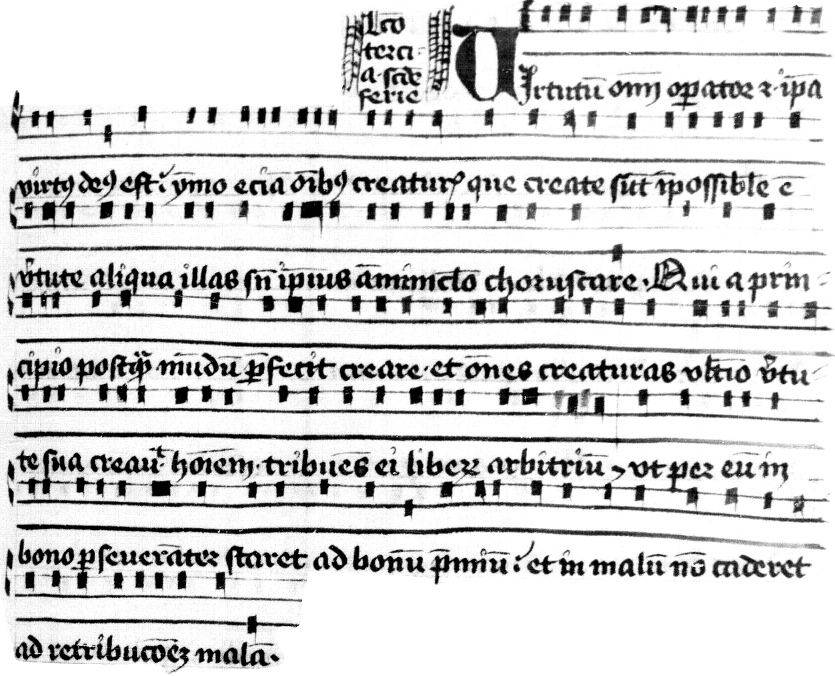
|
Leccio terci·- a·secunde ferie |
[Läsning nr tre den andra dagen] (dvs måndag) |
[Lesson no. three the second day] (i.e. monday) |
|
VIrtutum omnium1 operator, & ipsa virtus deus est; |
ALla krafters utförare, och själva kraften är Gud2, |
THe operator of all forces, and each force itself, is God2, |
|
ymmo eciam omnibus creaturis que create sunt impossibile est virtute aliqua illas sine ipsius amminiculo choruscare · |
så det är till och med så, för alla skapade varelser, som är skapade, att det är omöjligt för dem att med någon kraft röra sig utan hans hjälp, |
so it's even the case, for all created things, that are created, that it's impossible for them that, with any force, move without his help, |
|
Qui a principio postquam mundum perfecit creare · et omnes creaturas ultimo virtute sua creavit hominem · tribuens ei liberum arbitrium, |
han som i begynnelsen - efter det att han slutfört att skapa världen och alla skapade varelser - med sin yttersta kraft skapade människan, givande henne fritt omdöme, |
he who in the beginning - after that he had finished creating the world and all created things - with his utmost power created man, giving her free judgement, |
|
ut per eum in bono perseveranter staret ad bonum premium ; |
så att hon med det skulle stå uthålligt i det goda, till god belöning, |
so that she, with it, should stand perseverent in the good, to a good reward, |
|
et in malum non caderet ad retribucionem malam · |
och inte falla i det onda till ond vedergällning. |
and not fall into evil to evil retribution. |
| 1). I manuskriptet är många ord förkortade, här står det t ex “oim” med ett streck över som skall markera att det är en förkortning. I transkriberingen är de bortförkortade bokstäverna utskrivna med kursiv. | 1). In the manuscript, many words are abbreviated: here, for example, it says “oim” with a stroke over, indicating that it is an abbreviation. In the transcription the abbreviated letters are italicized. |
| 2). Jag tänker mig att Gud inte bara är t ex gravitation, utan också den som fäster gravitationen vid de saker som skall anses ha massa och dras till varandra, och slutligen den som ser till att graviationen gör sitt jobb ordentligt (varje likhet med Higgsmekanismen är en ren tillfällighet). På det sättet är Gud både transcendent och immanent. | 2). I imagine that God not only is, for example, gravity, but also the one that attaches gravity to things that shall be considered having mass and attract each other, and finally the one who ensures that gravity does its job properly (any similarity to the Higgs mechanism is purely coincidental). In this way God is both transcendent and immanent. |
|
CONDUCTUS med text av Philip Kanslern (ca 1160-1236) och musik av Perotinus Magnus (fl1 1200) |
CONDUCTUS with text by Philip the Chancellor (ca 1160-1236) and music by Perotin the Great (fl1 1200) |
|
Omnia sub peccato clausit ade meritum dum pronior in vetitum non paruit mandato |
Allt är under synd stängt av Adams förtjänst, när, mer böjd åt det förbjudna, han inte lydde påbudet. |
Everything is under sin closed by Adam's merit, as, prone to the forbidden, he didn't obey the command. |
|
de statu tam beato nos dedit in interitum de morsu venenato fel inhesit palato |
Från ett så saligt tillstånd gav han oss till undergång. Av förgiftat bett klibbade galla fast i gommen. |
From such a blessed state he gave us to ruin. From poisoned bite gall adhered to the palate. |
|
per hoc culpe dispendium in vitium nascentium translato |
Genom denna skuldens utgift till fördärv allt fött är överflyttat. |
Through this expense of guilt, to vice everything born is transferred. |
|
mortis amare poculum in seculum transfunditur nil cui dulce bibitur de vase vitiato |
Den bittra dödens kalk för evigt utgjuts. Inget ljuvt kan drickas från den fördärvade vasen. |
Death's bitter cup forever is being poured out. Nothing sweet can be drunk from the damaged vase. |
| [Från Firenze Biblioteca Mediceo-Laurenziana Pluteo 29,I, populärt kallat Firenze eller bara F, ett franskt 1200-talsmanuskript med 1100-talsmusik.] | [From Firenze Biblioteca Mediceo-Laurenziana Pluteo 29,I, popularly called Firenze or just F, a french 13th century manuscript with 12th century music.] |
| 1). fl = floruit, “blomstrade”, vilket betyder att han levde åtminstone vid detta tillfälle. | 1). fl = floruit, “blossomed”, which means he lived at least at this moment. |
|
[Ett sätt att avbilda utdrivandet ur Eden är med förfluten tid till vänster, gestaltad av paradisets stängda port vaktad av en svärdsbeväpnad ängel som ibland, kanske på grund av svärdet, identifieras med ärkeängeln Mikael, och med Adam och Eva på väg in i framtiden till höger. Adam vänder sig tillbaka eller är förkrossad, medan Eva vänder sig mot framtiden med beslutsamhet, nyfikenhet eller tillförsikt, kanske på grund av den medeltida tolkningen av 1 Mos 3:15 där Gud säger att hon skall krossa ormens huvud, det citat som gjorde att man under medeltiden ibland identifierade Eva med Maria.
Bilderna är från Caedmonmanuskriptet (900-tal), Hieronymus Bosch (1400-tal) och Raphael (1500-tal).] |
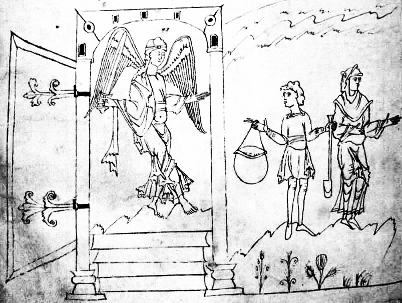 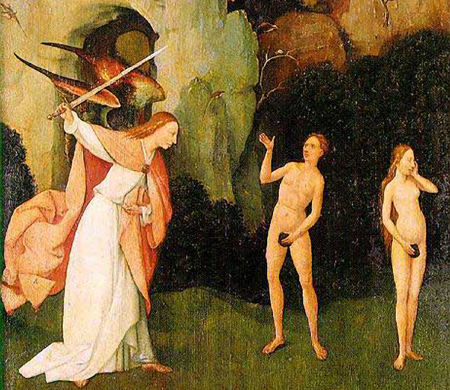 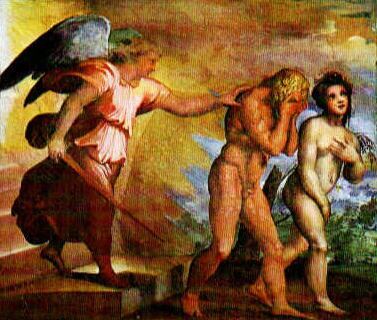 |
[One way of representing the expulsion from Eden, is with past tense to the left, i the shape of the closed gate of paradise guarded by sword armed angel, who sometimes, perhaps because of the sword, is identified as the archangel Michael, and with Adam and Eve on their way into the future to the right. Adam is facing back, or is broken, whereas Eve is facing the future with determination, curiosity or trust, maybe due to the medieval interpretation of Genesis 3:15, where God says that she shall crush the head of the snake, a passage that sometimes made Eve identified with virgin Mary.
The images are from the Caedmon manuscript (10th century), Hieronymus Bosch (15th century) and Raphael (16th century).] |
| HYMN UR SYSTRARNAS SÅNG | HYMN FROM THE SONG OF THE SISTERS |
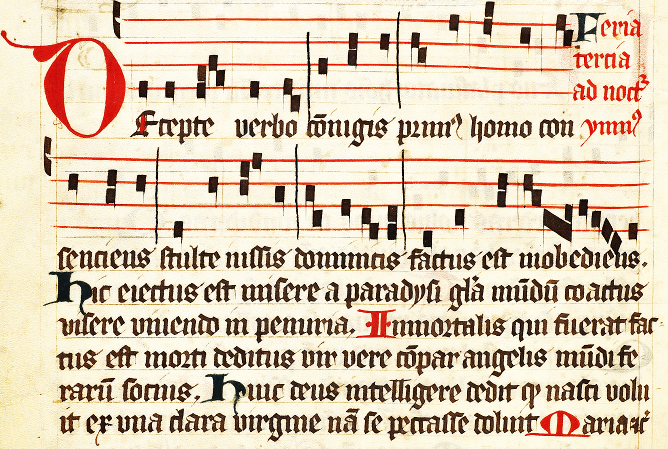
| [Faksimilet är från A84, ett 1400-talsmanuskript med Birgittasystrarnas musik, inköpt 1893 till Kungliga Biblioteket från prinsen av Borghias bibliotek.] | [The facsimile is from A84, a 15th century manuscript with the music of the Bridgettine sisters, bought in 1893 to the Royal library of Stockholm from the library of the prince of Borghia.] |
|
Decepte verbo coniugis primus homo consenciens stulte iussis dominicis factus est inobediens. |
Till den bedragna hustruns ord samtyckte den förste mannen oförnuftigt, mot gudomliga bud blev han olydig. |
To the words of the deceived wife the first man consented foolishly, against lordly commands he became inobedient. |
|
Hic eiectus est misere a paradysi gloria mundum coactus visere vivendo in penuria. |
Han blev olyckligt utkastad från paradisets härlighet, tvingad att se världen, att leva i fattigdom. |
He was miserably ejected from paradise's glory, forced to see the world, living in penury. |
|
Inmortalis qui fuerat factus est morti deditus vir vere compar angelis mundi ferarum socius. |
Han som varit odödlig blev given åt döden, en man verkligen jämbördig med änglar sällskap åt världens vilddjur. |
He who had been immortal was given to the mortals, a man truly comparable to angels, company to the world's beasts. |
|
Huic deus intelligere dedit quod nasci voluit ex una clara virgine nam se pecasse doluit. |
Honom lät Gud förstå att han ville födas av en lysande jungfru när han sörjde att han syndat. |
Him made God understand that he wanted to be born of a clear virgin, since he deplored having sinned. |
| RESPONSORIUM UR SYSTRARNAS SÅNG | RESPONSORY FROM THE SONG OF THE SISTERS |
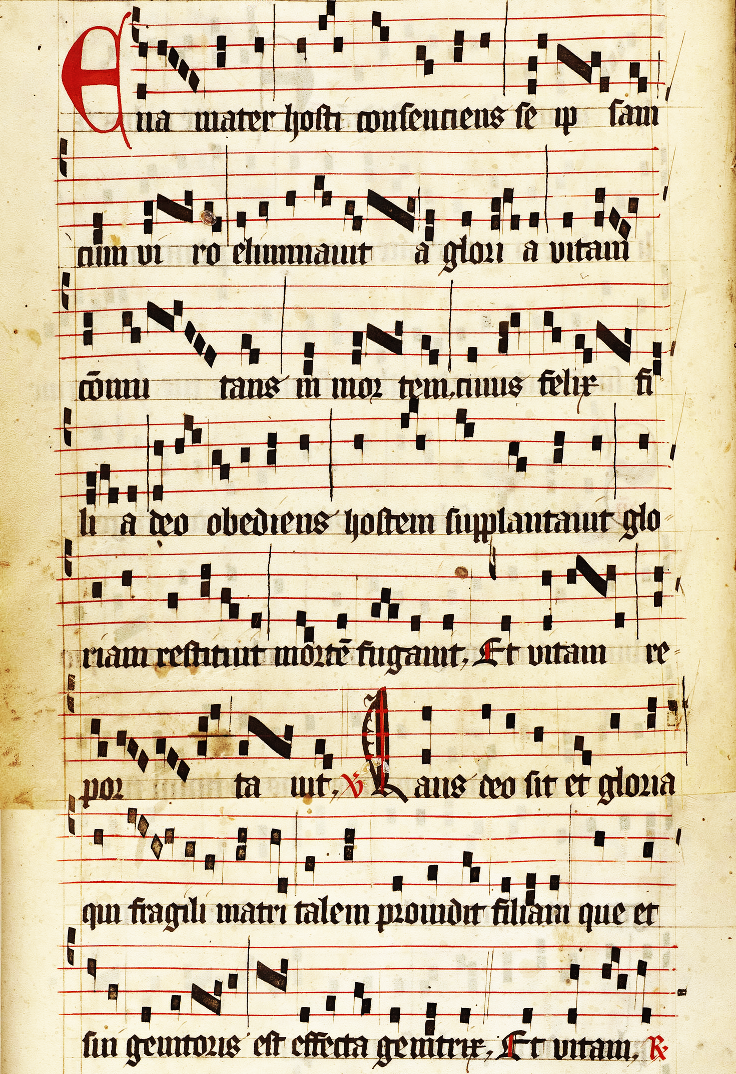
|
Eva mater hosti consenciens, se ipsam cum viro eliminavit a gloria, vitam commutans in mortem, cuius felix filia deo obediens hostem supplantavit1, gloriam restituit, mortem fugavit, |
Mor Eva, samtyckande med fienden; sig själv, med man, borttog hon från ära, bytte livet mot döden, hon, vars lyckosamma dotter, lydande Gud, satte krokben1 för fienden, återställde äran, drev döden på flykt, |
Mother Eve, consenting the enemy, herself, with husband, she eliminated from glory, commuted life to death, whose lucky daughter obeying God tripped up1 the enemy, restituted glory, put death to flight |
|
Et vitam reportavit. |
och återbar livet. |
and brought back life. |
|
Laus deo sit et gloria, qui fragili matri talem providit filiam, que et sui genitoris est effecta genitrix. |
Lov och ära åt Gud, som den bräckliga modern försåg med en sådan dotter, som till sin skapare blev till föderska2 |
Praise to God and glory, who, to the fragile mother provided such a daughter who to her creator |
|
Et vitam reportavit. |
och återbar livet. |
and brought back life. |
| 1). Detta syftar på 1 Mos. 3:15 där Gud säger att Eva skall krossa ormens huvud. Ordet för att lägga krokben för något, “supplanto”, betyder ordagrant att “under-fotsula” något, så det borde väl rent teoretisk kunna betyda att krossa något under eller med fotsulan, dock har jag inte sett någon annan översättning än “krokben”. Frågan är bara hur man lägger krokben för en orm. | 1). This refers to Genesis 3:15 where God says that Eve shall crush the head of the snake. The word for tripping up something, “supplanto”, literally means to “under footsole” something, which would make it hypothetically possible mean to crush something with or under the footsole, but on the other hand I have not seen any other translation that “trip up”. The question is, how do you trip up a snake? |
| 2). Ett vanligt medeltida motiv: Den Gud Fader som skapat allt, och därmed också Eva och Maria, är i sin tur född av Maria, vilket inte nödvändigtvis är riktigt samma sak som att Maria är “Guds moder” och “Gudaföderska”. Se till exempel http://en.wikipedia.org/wiki/Roman_Catholic_Mariology#Mother_of_God och http://en.wikipedia.org/wiki/Theotokos#Theology | 2). A common medieval motif: The God Father who has created everything, including Eve and Mary, is himself born by Mary, which isn't exactly the same thing as Mary being “Mother of God”, or “The One Giving Birth To God”. See for example http://en.wikipedia.org/wiki/Roman_Catholic_Mariology#Mother_of_God and http://en.wikipedia.org/wiki/Theotokos#Theology |
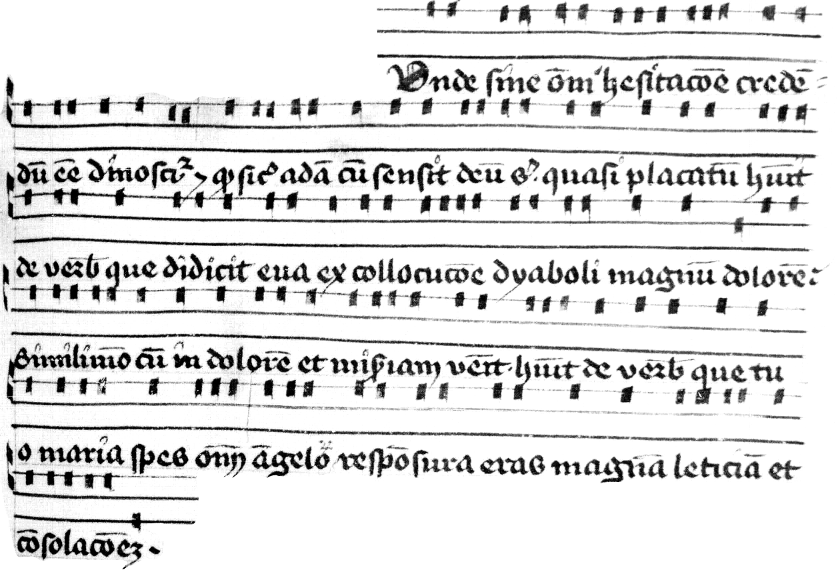
|
Unde sine omni hesitacione credendum esse dinoscitur, |
Därför, utan varje tvekan, skall man veta att tro på |
Therefore, without every hesitation, one shall know to believe |
|
quod sicut adam cum sensit deum sibi quasi placatum habuit de verbis que didicit eva ex collocucione dyaboli magnum dolorem; |
att liksom Adam (när han uppfattade Gud vara nästan lugnad gentemot sig) hade, av orden som Eva lärt av samtalet med djävulen, [fått] stor smärta, |
that, just as Adam (when he sensed God to be almost placated toward him) had - from the words that Eve learnt from the collocution with the devil - great pain, |
|
simili modo cum in dolorem et miseriam venit· habuit de verbis que tu o maria spes omnium angelo responsura eras magnam leticiam et consolacionem. |
på samma sätt, när han kommit i smärta och elände, hade han, av orden som du - O, Maria, alltets hopp - skulle svara ängeln, stor glädje och tröst. |
in the same way, when he had come in pain and misery, he had, from the words that you - O Mary, the hope of everything - should answer the angel, great happiness and consolation. |
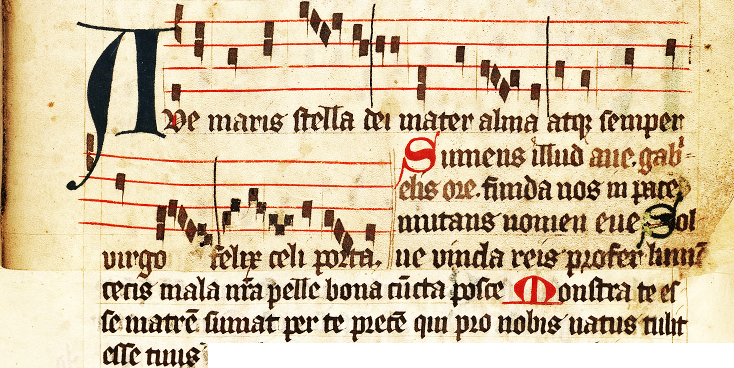
|
Ave maris stella dei mater alma atque semper virgo felix celi porta. |
Var hälsad, havets stjärna, Guds hulda moder, och alltid jungfru, himlens lyckobringande port. |
Hail, star of the sea, God's nourishing mother, and always virgin, heaven's lucky portal. |
|
Sumens illud ave gabrielis ore, funda nos in pace mutans nomen eve. |
Upptagande detta “Ave” från Gabriels mun, befäst oss i frid, när du vänder på Evas namn |
Assuming this “Ave” from Gabriel's mouth, confirm us in peace, transforming Eve's name. |
|
Solve vincla reis profer lumen cecis mala nostra pelle bona cuncta posce |
Lös den anklagades bojor, bringa ljus åt den blinde, stöt bort vårt onda, kräv allt gott. |
Untie the accused's fetters, bring light to the blind, repel our evil, demand all good. |
|
Monstra te esse matrem sumat per te precem qui pro nobis natus tulit esse tuus. |
Visa dig vara moder, så han genom dig tar emot bön, han som för att födas åt oss accepterade att vara din. |
Show yourself to be mother, he who, to be born to us, beared to be yours. |
|
Dolebat quoque adam quod corpus eve a suo corpore creatum ipsum ad perpetuam inferni mortem deceptorie traxerat, |
Det smärtade också Adam att Evas kropp, av hans kropp skapad, bedrägligen dragit honom till underjordens ständiga död, |
It also pained Adam, that Eve's body, created of his body, deceptively had pulled him to |
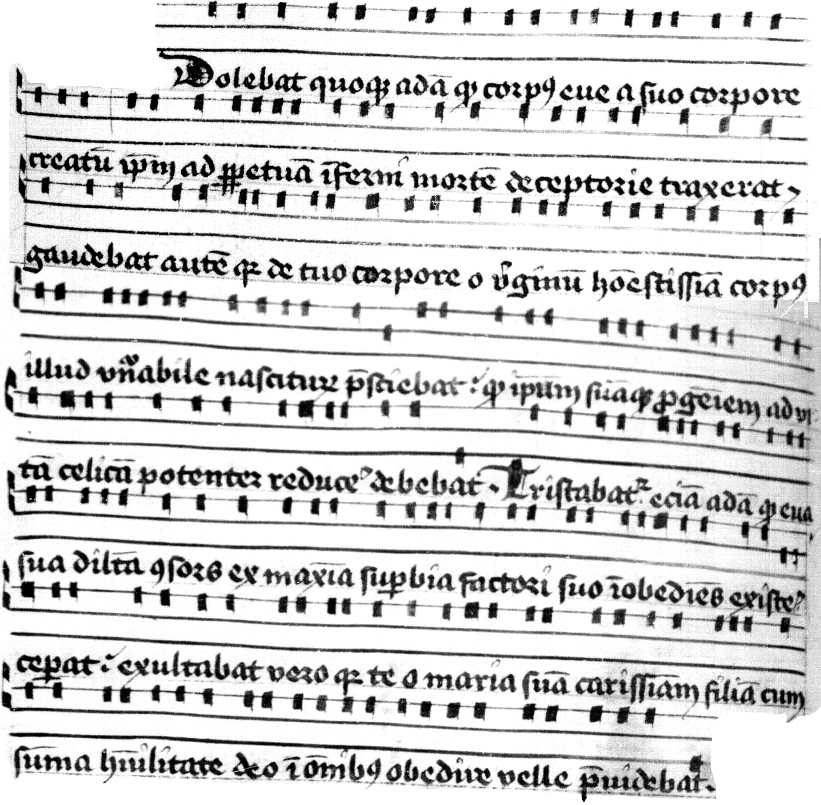
|
gaudebat autem quia de tuo corpore o virginum honestissima corpus illud venerabile nasciturum presciebat; |
men han gladdes eftersom han på förhand visste att av din kropp - O, ärligaste jungfru! - den vördnadsvärda kropp skulle skapas |
but he was happy since he foreknew that of your body - O, most honest virgin! - that venerable body would be created |
|
quod ipsum suamque progeniem ad vitam celicam potenter reducere debebat. |
som var bestämd att mäktigt återföra honom och hans ättlingar till det himmelska livet. |
which was bound to mightily bring back him and his progeny to heavenly life. |
|
Tristabatur eciam adam quod eva sua dilecta consors ex maxima superbia factori suo inobediens existere ceperat; |
Adam sörjde även över att Eva, hans älskade kamrat, av största övermod börjat vara olydig mot sin skapare. |
Adam grieved also that Eve, his beloved comrade, of maximal pride had begun to be inobedient to her maker. |
|
exultabat vero quia te o maria suam carissimam filiam cum summa humilitate deo in omnibus obedire velle previdebat. |
Han jublade sannerligen eftersom han förutsåg dig, - O, Maria, hans käraste dotter! - med högsta ödmjukhet vilja lyda Gud i allt. |
He exulted truly since he foresaw you - O, Mary, his beloved daughter! - with highest humility wanting to obey God in everything. |
| HYMN UR SYSTRARNAS SÅNG | HYMN FROM THE SONG OF THE SISTERS |
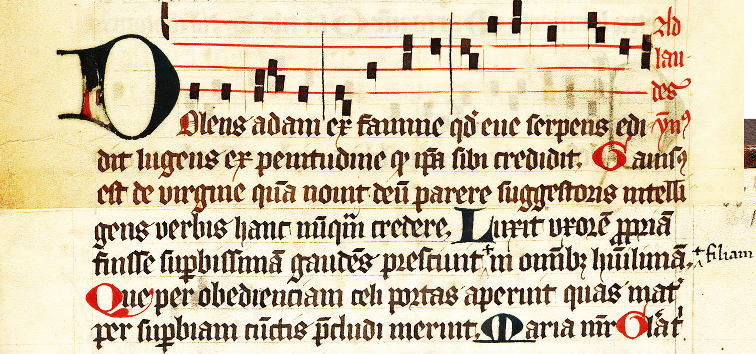
|
Dolens adam ex famine quod eve serpens edidit lugens ex penitudine quod ipsa sibi credidit |
Adam - som kände smärta av hungern som ormen ingav Eva, och som sörjde av ånger att hon trodde den - |
that the serpent gave Eve, mourning from regret that she believed it - |
|
Gavisus est de virgine quam novit deum parere suggestoris intelligens verbis hanc nunquam credere. |
blev glad av jungfrun som han visste skulle föda Gud, han förstod att frestarens ord skulle hon aldrig tro. |
was glad from the virgin that he knew would bear God, understanding that the suggestor's words she would never believe. |
|
Luxit uxorem propriam fuisse superbissimam gaudens prescivit filiam in omnibus humilimam. |
Han sörjde att hans egen hustru varit högmodig, glädjande sig visste han dottern i allt vara ödmjuk, |
He mourned that his own wife had been most proud, rejoicing he foreknew the daughter to be humble in everything, |
|
Que per obedienciam celi portas aperuit quas mater per superbiam cunctis precludi meruit. |
hon som genom lydnad öppnade himlens portar som modern genom övermod lyckats stänga för alla. |
she who, through obedience, opened heaven's gates that the mother, through pride, managed to close for everyone. |
| LÄSNING UR ÄNGELNS DIKTAMEN | LESSON FROM THE ANGEL'S SERMON |
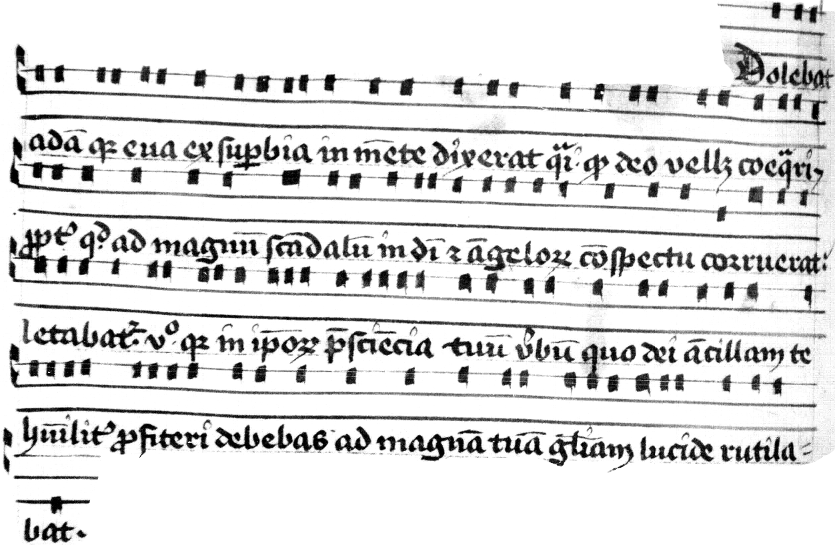
|
Dolebat adam quia eva ex superbia in mente dixerat quasi quod deo vell& coequari, |
Adam sörjde, eftersom Eva av högmod i sinnet sagt som om hon velat jämställas med Gud. |
Adam mourned since Eve through pride in her soul had said almost as if |
|
propter quod ad magnum scandalum in dei & angelorum conspectu corruerat; |
På grund av detta hade hon störtat till stor förargelse i Guds och änglars åsyn. |
Because of this she had fallen down to great scandal in the sight of God and angels. |
|
letabatur vero quia in ipsorum presciencia tuum verbum quo dei ancillam te humiliter profiteri debebas ad magnam tuam gloriam lucide rutilabat. |
Han gladdes verkligen, ty i deras förutvetande strålade klart ditt ord med vilket, till din stora ära, du var bestämd att tillkännage dig ödmjukt vara tjänarinna1. |
He really rejoiced since, in their prescience shone clearly your word, with which, to your great honor, you were bound to declare yourself God's little maid1. |
| 1). Ecce ancilla Domini, “Se Herrens tjänarinna”, Luk. 1:38. | 1). Ecce ancilla Domini, “Behold the handmaid of the Lord”, Luke 1:38. |
| KORT RESPONSORIUM MED VERSIKEL | SHORT RESPONSORY WITH VERSICLE |
| [Från A84. Det finns olika typer av responsorier. De heter så eftersom någon eller några sjunger före, och andra svarar. | [From A84. There are different kinds of responsories. They are so called, since one or a few start to sing, and others respond. |
| Versikel betyder “liten vers”, och det syftar på den lilla snutten på slutet som börjar Eve maria filia, “Maria, Evas dotter”. | Versicle means “small verse” and refers to the snippet at the end, beginning Eve maria filia, “Mary, Eve's daughter”. |
| Birgittinersystrarnas liturgi är en vecka lång, och de korta responsorierna bildar en slags stafetthistoria genom hela veckan, på så sätt att föregående responsoriums versikel blir text till nästa responsorium.] | The Bridgettine sisters's liturgy is one week long, and the short responsories form a sort of relayed story through the whole of the week, i.e. that each previous versicle becomes the text to the next responsory.] |
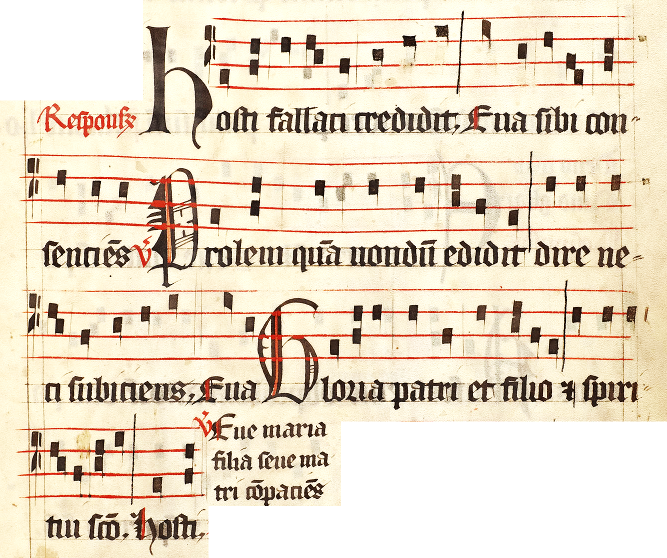
|
Hosti fallaci credidit, Eva sibi consenciens |
På den bedrägliga fienden trodde Eva, när hon samtyckte med denne. |
In the fallacious enemy she believed, Eve, consenting with it. |
|
Hosti fallaci credidit eva sibi consenciens |
På den bedrägliga fienden trodde Eva, när hon samtyckte med denne. |
Eve, consenting with it. |
|
Prolem quam nondum edidit dire neci subiciens |
Avkomman som hon ännu inte fött underkastade hon den gruvliga döden, |
The offspring she hadn't born she subjected to dire death, |
|
eva sibi consenciens |
Eva, samtyckande med denna. |
Eve, consenting with it. |
|
Gloria patri et filio & spiritui sancto |
Ära åt Fader och Son och Helig Ande. |
Glory to Father and Son and Holy Spirit. |
|
Hosti fallaci credidit eva sibi consenciens |
På den bedrägliga fienden trodde Eva, när hon samtyckte med denne. |
Eve, consenting with it. |
|
Eve Maria filia seve matri compatiens |
Maria, Evas dotter, av medlidande med den rasande modern, |
Mary, Eve's daughter, compassionate with the furious mother, |
|
Aufert ejus obprobria actorem vite pariens |
förde bort hennes vanära, när hon födde livets skapare. |
took away her dishonour giving birth to the creator of life. |
| LÄSNING UR ÄNGELNS DIKTAMEN | LESSON FROM THE ANGEL'S SERMON |
|
Tristabatur eciam adam quia verbum eve deum ad iram provocaverat sibi sueque posteritati ad dampnacionem, |
Adam bedrövades även eftersom Evas ord provocerat Gud till vrede, honom och deras efterkommande till fördömelse, |
Adam was also saddened since Eve's word provoced God to ire, him and their offspring to damnation, |
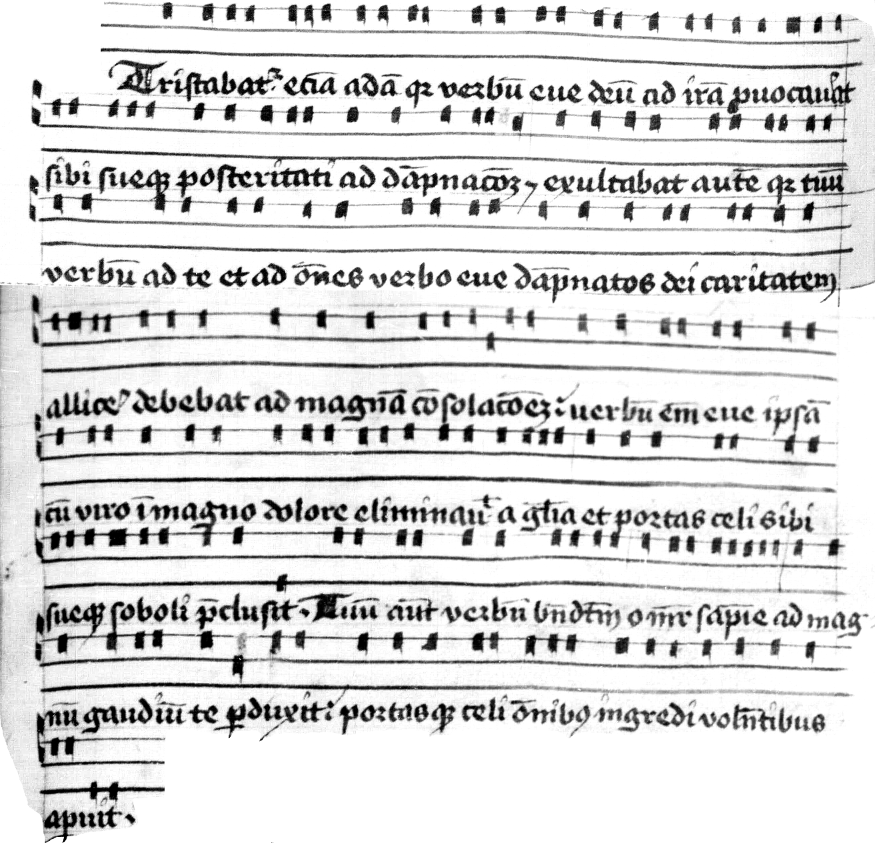
|
exultabat autem quia tuum verbum ad te et ad omnes verbo eve dampnatos dei caritatem allicere debebat ad magnam consolacionem; |
men han jublade, eftersom ditt ord till dig och till alla av Evas ord fördömda skulle dra till sig Guds kärlek, till stor tröst, |
but he rejoiced since your word, to you and to all damned by Eve's word, would attract God's love, to great consolation, |
|
verbum enim eve ipsam cum viro in magno dolore eliminavit a gloria et portas celi sibi sueque soboli preclusit. |
ty Evas ord hade uteslutit henne och mannen i stor smärta från ära, och (uteslutit) henne och hennes avkomma från himlens portar, |
since Eve's word had excluded her - with man, in great pain - from glory, and (excluded) her and her offspring from heaven's portals, |
|
Tuum autem verbum benedictum o mater sapiencie ad magnum gaudium te perduxit; |
men ditt välsignade ord, - O!, vishetens moder - har fört dig till stor glädje, |
but your blessed word - O, mother of wisdom - |
|
portasque celi omnibus ingredi volentibus aperuit. |
och himlens portar har det öppnat för alla som vill gå in. |
and heaven's portals it has opened for all who want to enter. |
| KORT RESPONSORIUM MED VERSIKEL | SHORT RESPONSORY WITH VERSICLE |
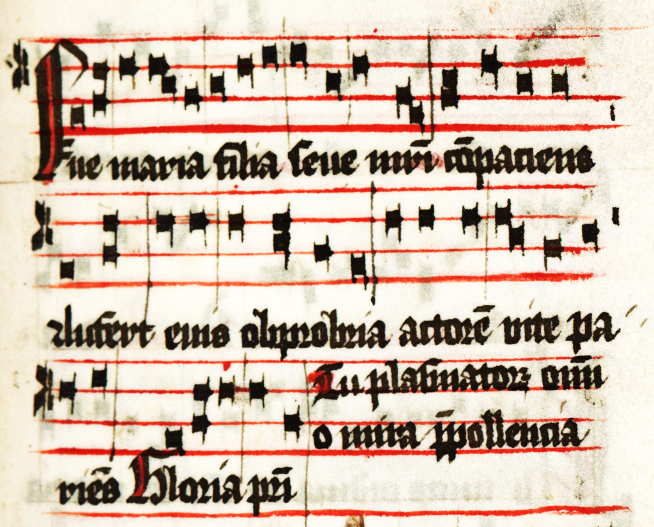
|
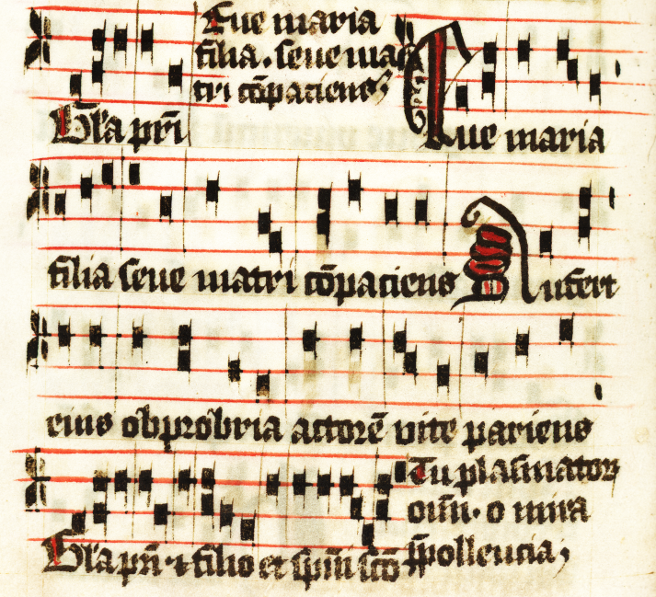
|
| [C485 och C482, två manuskript på Carolina Rediviva i Uppsala] | [C485 and C482, two manuscripts in Carolina Rediviva in Uppsala] |
|
Eve Maria filia seve matri compatiens |
Maria, Evas dotter, av medlidande med den rasande modern, |
Mary, Eve's daughter, compassionate with the furious mother, |
|
|
|
|
|
Aufert ejus obprobria actorem vite pariens |
förde bort hennes vanära, när hon födde livets skapare, |
took away her dishonour giving birth to the creator of life, |
|
|
|
|
|
Gloria patri et filio et spiritui sancto |
Ära åt Fader och Son och Helig Ande. |
Glory to Father and Son and Holy Spirit. |
|
|
|
|
|
Tu plasmatorum omnium o mira prepollencia |
- O!, du underbara, mäktigare än allt skapat, |
- O!, you miraculous, surpassing all that is created, |
|
|
|
|
| LÄSNING UR ÄNGELNS DIKTAMEN | LESSON FROM THE ANGEL'S SERMON |
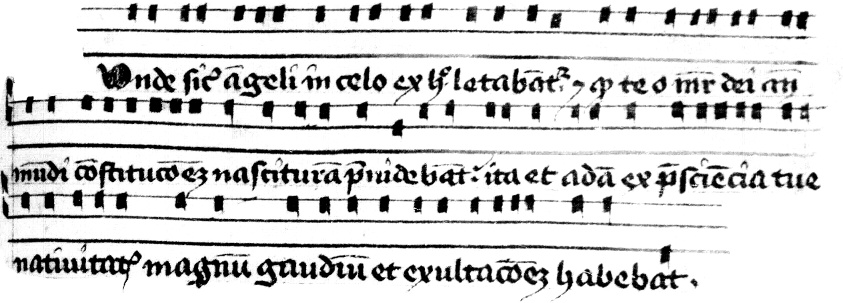
|
Unde sicut angeli in celo ex hoc letabantur, |
Så liksom änglarna i himlen gladdes av detta, |
So, as angels in heaven rejoiced from this, |
|
quod te o mater dei ante mundi constitucionem nascituram previdebant; |
att de före världens skapelse förutsåg dig - O!, Guds moder - skola födas, |
that they foresaw you - O!, mother of God - to be born, |
|
ita et adam ex presciencia tue nativitatis magnum gaudium et exultacionem habebat. |
likaså, även Adam hade, av före-vetande om din födelse, stor glädje och jubel. |
likewise, also Adam
had, from foreknowing your birth great happiness and rejoicing. |
| KORT RESPONSORIUM MED VERSIKEL | SHORT RESPONSORY WITH VERSICLE |
|
Ecce mulier conterens1 caput dolosi serpentis |
Se kvinnan som krossar1 huvudet på det skadliga ormen, |
See the woman crushing1 the head of the injurious serpent, |
|
|
|
|
|
Prothoplaustorum glorie hostiliter invidentis |
som fientligt var avundsjuk på de först skapades ära, |
hostilely envious of the glory of the first created, |
|
|
|
|
|
Gloria patri et filio et spiritui sancto. |
Ära åt Fader och Son och Helig Ande. |
Glory to the Father and Son and Holy Spirit. |
|
|
|
|
|
Ad coronam letitie triumphatrix sublevatur |
Till glädjens krona segrarinnan upphöjs2. |
To the crown of happiness the triumphess is raised2. |
|
Leviathan supplantatus3 tetro carceri mancipatur |
Den krossade3 Leviatan4 överlämnas till det hemska fängelset5. |
The crushed3 Leviathan4 is transferred to the hideous prison5. |
| 1). Detta syftar på 1 Mos. 3:15, och det här är det ord som Gud använder när han säger att Eva skall krossa ormens huvud. | 1). This refers to Genesis 3:15, and this is the word God uses, when he says that Eve shall crush the head of the snake. | 2). Marias kröning till himmelens drottning. | 2). The coronation of virgin Mary to the Queen of Heaven. | 3). Här är det däremot krokben, snarskank m m. För terminologi beträffande detta: http://sverigesradio.se/sida/artikel.aspx?programid=411&artikel=3211609 | 3). Here it is tripping up again. | 4). Ett stort havs- eller kaosmonster omnämnt Ps. 74:13-14 och 104:26, och Jes. 27:1 (i Job 3:8 och 40:20-41:25 är det nog en krokodil), och som associerats med “djupet” i 1 Mos. 1:2, ormen i paradiset, och draken i Upp. 12:1-9. | 4). A huge sea or chaos monster, mentioned i Psalms 74:13-14 and 104:26, and Isaiah 27:1 (in Job 3:8 and 40:20-41:25 it is probably a crocodile), assiciated with “The Deep” in Genesis 1:2, the snake in paradise, and the dragon in Revelations 12:1-9. | 5). Underjorden i Upp. 20:2-3. | 5). The pit in Revelations 20:2-3. |
| NOVA NOVA | AVE FIT EX EVA |
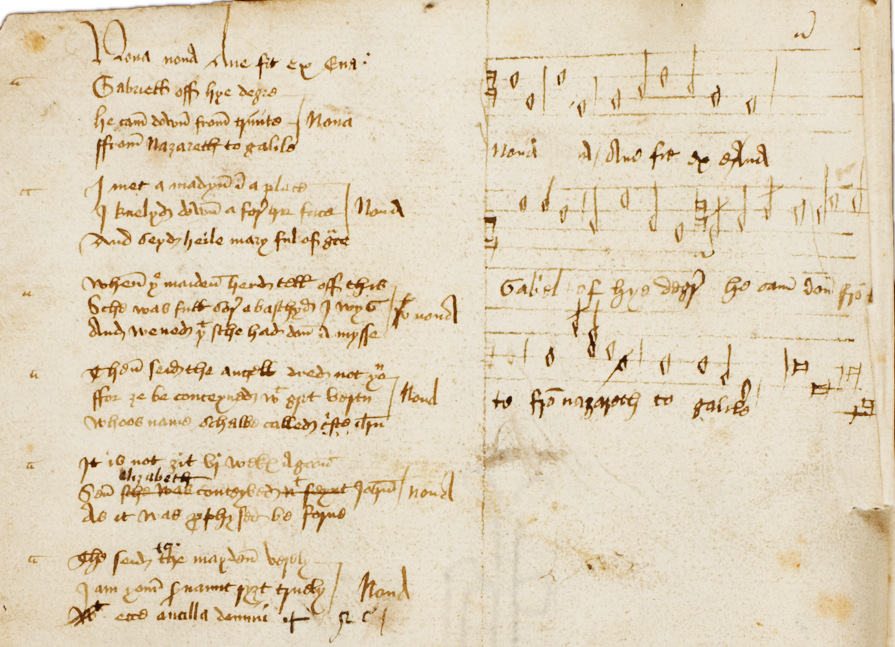
| [Denna populära carol finns i flera engelska manuskript, men bara detta (MS Hunter 83) från Glasgow har någon form av melodi utskriven. Till skillnad från de andra manuskripten som presenterar texten prydligt och regelbundet, med versmått och rim, ett större antal verser, och en mer fullständig historia, så är denna version full av ändringar både i text och melodi, och ger ett ofärdigt intryck, ungefär som ett utkast. Till skillnad från de andra manuskripten är detta heller inte någon musikhandskrift, utan en krönika, och sången verkar bara ha hamnat här på försättsbladet för att det var första bästa lediga skrivutrymme. | [This popular carol is found in several british manuscripts, but only this one (MS Hunter 83) from Glasgow has any melody written out. As opposed to the other manuscripts, that present the text neatly and regularly, with correct meter and rhyme, a greater number of verses, and a more complete story, this version is full of corrections both in text and melody, and gives an unfinished impression, like a draft. As opposed to the other manuscripts, this is furthermore not a music manuscript, but a chronicle, and the song has just ended up here, since the manuscript had some spare space. |
| Bokstaven “þ” kallas thorn, “törne”. Den fanns också på medeltidssvenska och motsvarar det läspande th. Bokstaven “ȝ” kallas yogh. Den är ett frikativt g som uttalas som ett tonande ich- eller ach-ljud, och sedermera oftast skrevs som gh.] | The letter “þ” is called thorn, and corresponds to the fricative th. The letter “ȝ” is called yogh, and corresponds to a fricative g, like a voiced ich- or ach-sound, and was later written as gh.] |
|
Nova nova Ave fit ex Eva : |
|
|
|
|
|
Gabriell off hye degre he cam down from trinite From Nazarath to galile |
Nova |
|
Gabriel av hög grad, han kom ner från treenigheten, från Nazareth till Galileen. |
Nytt... |
|
I met a madyn in a place I knelyd down a fore hir face And seyd heile mary ful of grace |
Nova |
|
Jag mötte en flicka på ett ställe, jag knäböjde för hennes ansikte och sade “Hell Maria, full av nåd”. |
Nytt... |
|
When þe mayden herd tell off this Sche was full sore1 a baschyd i wys And wened2 þat sche had don a mysse |
|
|
När flickan hörde talas om detta var hon helt svårt skamsen, förvisst och tänkte att hon gjort fel. |
Nytt... |
|
Then seid the angell dred not yuo For ȝe be conceyvad wt gret vertu Whoos name schalbe called criste3 ihesu |
Nova |
|
Då sade ängeln “Frukta inte, du, för du blir havande med stor dygd, vars namn skall bli kallat kristus jesus |
Nytt... |
|
It is not ȝit vj weks agoon elizabeth Sen As it was prophysed be forne |
Nova |
|
Det är ännu inte 6 veckor gångna Elisabeth Sen som det var profeterat förut. |
Nytt... |
|
The seid the mayden verely I am your servaunt ryȝt truely |
Nova |
|
Då sade flickan “Sannerligen, jag är din tjänare, riktigt ärligt. Se Guds tjänsteflicka”. |
Nytt... |
| 1). jfr engelska “sorely” och tyska “sehr”. | 1). cf. english “sorely” and german “sehr”. |
| 2). wenen, “betänka, anse” osv något kontrafaktiskt, dvs något som senare skall visa sig inte vara fallet. Se Robert E. Lewis: Middle English Dictionary, vol 130 s 307; “wēnen v.(2)”, jfr tyska wähnen med samma betydelse, från Wahn, samma “van” som i vanartig, vansläktas, vansinne och vanvett. | 2). wenen, to consider, to think &c something contrafactual, i.e. something that is not the case. See Robert E. Lewis: Middle English Dictionary, vol 130 p 307; “wēnen v.(2)”, cf. german wähnen with the same meaning, from Wahn. |
| 3). Ordet har expungerats, “strukits ut” genom en rad punkter under ordet. | 3). The word has been expungated, “crossed out”, by putting a series of dots under it. |
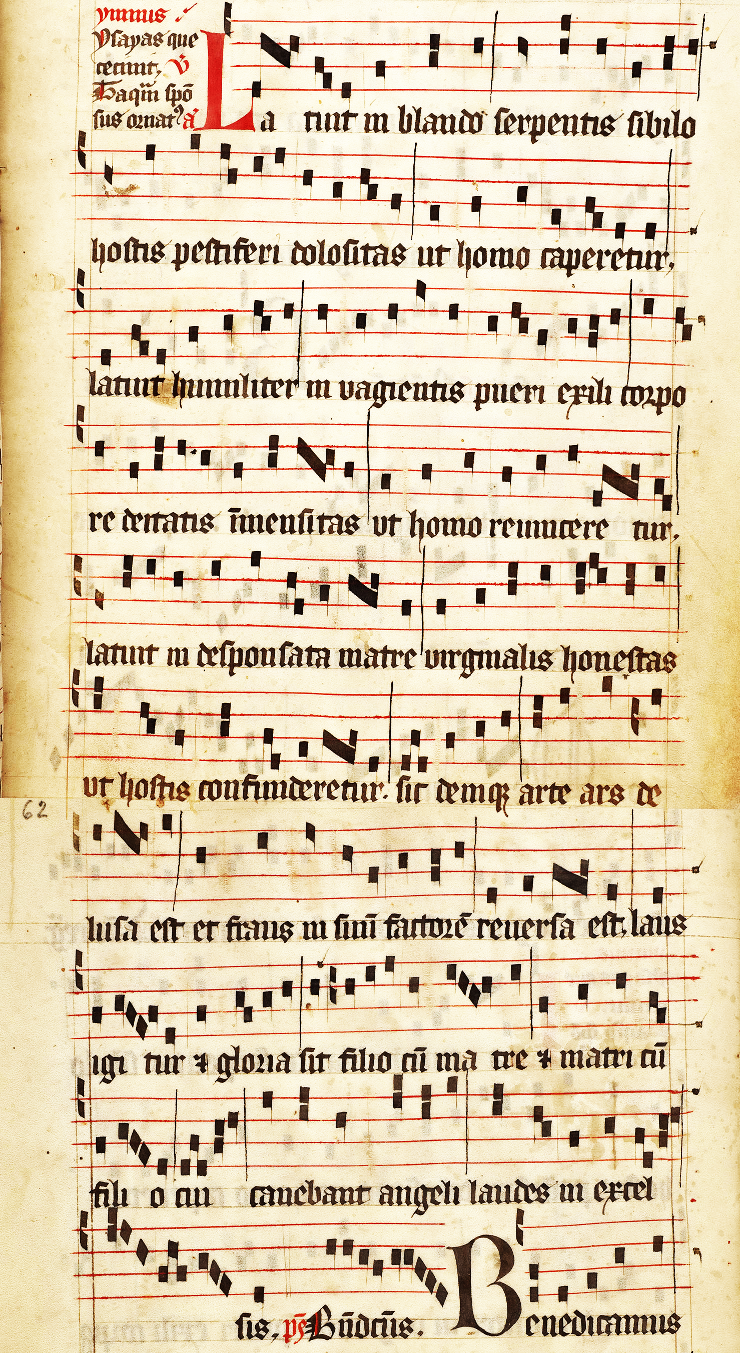
|
Latuit in blando serpentis sibilo hostis pestiferi dolositas ut homo caperetur. |
Den dolde sig i ormens lockande väsning: den pestbringande fiendens svek, för att människan skulle fångas. |
It hid in the enticing whisper of the serpent: so that man should be captured. |
|
latuit humiliter in vagientis pueri exili corpore deitatis immensitas ut homo revinceretur. |
Den dolde sig ödmjukt i det gnyende gossebarnets landsflyktiga1 kropp: gudomlighetens omätlighet, för att människan skulle återfångas. |
It hid humbly in the wailing child's exiled1 body: the godhead's immensity, so that man should be reconquered. |
|
latuit in desponsata matre virginalis honestas ut hostis confunderetur. |
Den dolde sig i den trolovade modern: jungfrulighetens ärlighet, för att fienden skulle förvirras. |
It hid in the betrothed mother: virginal honesty, so that the enemy would be confounded. |
|
sic denique arte ars delusa est et fraus in suum factorem reversa est. |
På så sätt blev till slut konsten narrad genom konsten och bedrägeriet återvände till sin skapare. |
So, finally, art was deluded by art and fraud was reversed to its maker. |
|
laus igitur & gloria sit filio cum matre & matri cum filio cui canebant angeli laudes in excelsis. |
Lov, således, och ära vare sonen med modern och modern med sonen åt vilka änglarna sjunger lovsånger i höjderna. |
Praise, therefore, and glory be to the son with mother and to the mother with son, to whom the angels sing praises in the highests. |
| 1). Landsflykten i Egypten i Matt. 2:13-21 är här en bild av hur Gud är landsflyktig från sin himmel när han är här på jorden. Det händer därför, som i Systrarnas Sång, att vår tillvaro här på jorden av detta skäl kallas “exil”. | 1). The exile in Egypt in Matthew 2:13-21 is here an image of how God is exiled from heaven when he is here on earth. Consequently, our existence here on earth is also sometimes, as in the Song of the Sisters, referred to as “exile”. |
| KORT RESPONSORIUM MED VERSIKEL | SHORT RESPONSORY WITH VERSICLE |
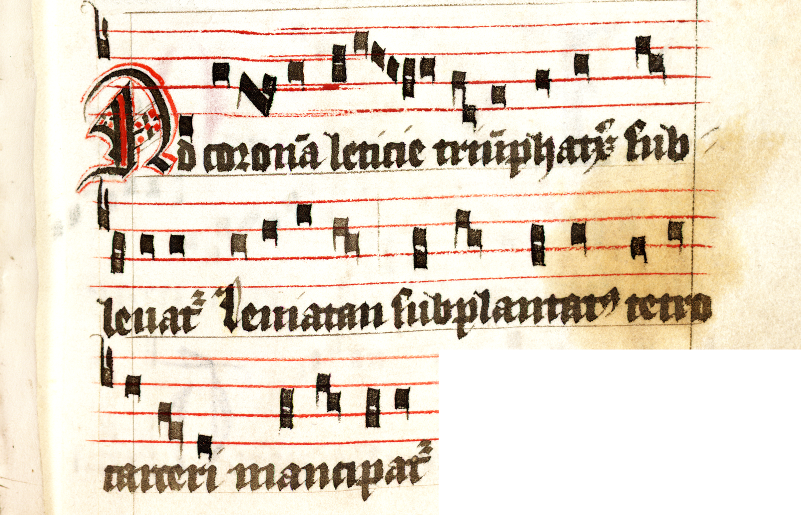
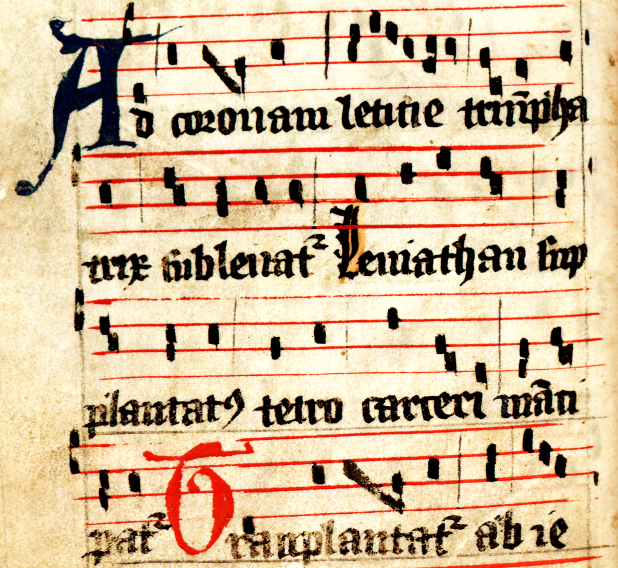
| [C468 överst, och C490, en mycket liten handskrift, därunder. Uppsala.] | [C468 on top, and C490, a very small manuscript, thereunder. Uppsala.] |
|
Ad coronam letitie triumphatrix sublevatur |
Till glädjens krona segrarinnan upphöjs. |
To the crown of happiness the triumphess is raised. |
|
|
|
|
|
Leviathan supplantatus tetro carceri mancipatur |
Den krossade Leviatan överlämnas till det hemska fängelset, |
The crushed Leviathan |
|
|
|
|
|
Gloria patri et filio et spiritui sancto. |
Ära åt Fader och Son och Helig Ande. |
Glory to Father and Son and Holy Spirit. |
|
|
|
|
|
Transplantatur ab iherico Rosa in iherusalem. |
Från Jeriko1 omplanteras rosen i Jerusalem, |
From Jericho1 is transplanted the rose to Jerusalem, |
|
Deum et angelos sua pulchritudine colletificans. |
med sin skönhet glädjande både Gud och änglar. |
with her beauty delighting both God and angels. |
| 1). Jeriko är världens lägst belägna stad, och synnerligen varm året om. Den är också världens första stad med stadsmurar, ca 8.000 fKr. Dess dubbla stadsmurar har vid ca 1400 fKr fallit utåt, antagligen pga jordbävning. Berättelsen i Josuas 6:e kapitel har tillkommit ett par århundraden senare för att förklara hur murarna fallit. Möjligen har man uppfört detta som ett spel vid ruinerna. Beskrivningen av hur det paraderas runt i sex dagar och hur allt störtar samman på den sjunde är en parallell till skapelsen och syndafallet. Jerikos ros i Vishetens Lov i Syr. 24:14 syftar här på Maria. | 1). Jericho is the world's lowest situated city, and excessively hot all year around. It is also the world's first city with city walls, around 8,000 BC. Its double city walls have around 1,400 BC fallen outwards, probably because of an earthquake. The story in Joshua 6 originated from a couple of centuries later, to explain how the walls had fallen. This has possibly been performed like a play at the ruins. The description of how the parade goes around for six days, and everything fell into ruins on the seventh, is a parallell to the creation and fall. The rose of Jericho in the Praise of Wisdom in Sirach 24:14 here refers to Virgin Mary. |
|
CONDUCTUS med text av Philip Kanslern (ca 1160-1236) och musik av Perotinus Magnus (fl 1200) |
CONDUCTUS with text by Philip the Chancellor (ca 1160-1236) and music by Perotin the Great (fl 1200) |
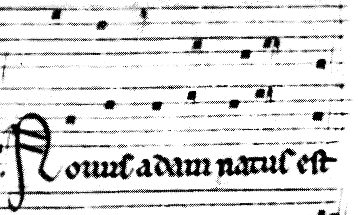
|
Novus adam natus est ut novetur mundus · |
Den nye Adam är född för att världen skall förnyas |
The new Adam is born |
|
a quo tamen factus est primus et secundus · |
av den som gjort den förste och den andre, |
by whom that also made the first and the second, |
|
quippe cum principium idem sit et terminus · servus atque dominus · |
eftersom med början så är han också slutet, tjänare och herre. |
since with the beginning he is also the end, servant and master. |
|
nescit hoc prepucium nescit hoc inmundus. |
Förhuden vet inte detta1. Den orene vet inte detta. |
The foreskin doesn't know this1. The unclean doesn't know this. |
|
[Ur Firenze] |
[From the Firenze manuscript] |
|
1). Den andre Adam var omskuren, den förste var det inte. Kristi omskärelse firas nyårsdagen. |
1). The second Adam was circumcised, the first was not. The circumcision of Christ is celebrated on new years day. |
| NYÅRSRONDELLUS | NEW YEAR RONDELLUS |
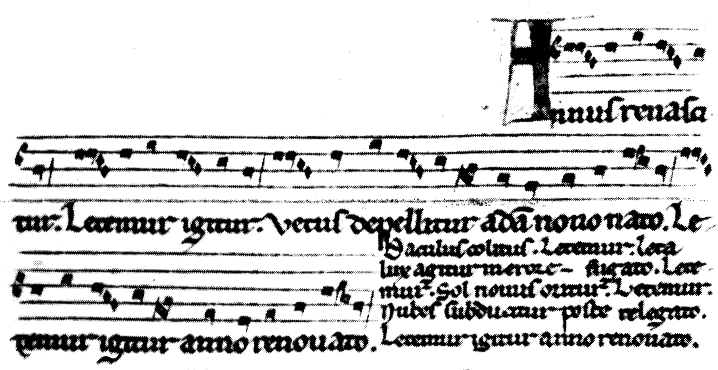
|
Annus renascitur Vetus depellitur Adam novo nato |
Året återföds; Det gamla kastas ut efter att den nye Adam fötts. |
The year is reborn; The old one is thrown out when the new Adam is born. |
|
Baculus colitur Leta lux agitur merore fugato |
Herdestaven hedras; Det glada ljuset firas efter att sorgen fördrivits. |
The rod is revered; The happy light is celebrated when sorrow is driven away. |
|
Sol novus oritur Nubes subducitur hoste1 relegato |
Den nya solen gryr; Molnen förs undan efter att fienden1 förvisats. |
The new sun is rising; The clouds are led away when the enemy1 is relegated. |
| 1). I manuskriptet står det klart och tydligt poste, “dörrposten”. Tills jag fattar vad det skulle kunna betyda så emenderar jag med Dreves i Analecta Hymnica XX: Cantiones et Muteti. I. Cantiones Natalitiae s 91 No 95 till hoste, “fienden”. | 1). The manuscript clearly states poste, “the door-post”. Until I grasp what that could mean, I emend as Dreves in Analecta Hymnica XX: Cantiones et Muteti. I. Cantiones Natalitiae p 91 No 95, to hoste, “the enemy”. |
BIBLIA PAUPERUM
| (Klicka för att förstora) | (Click to enlarge) |
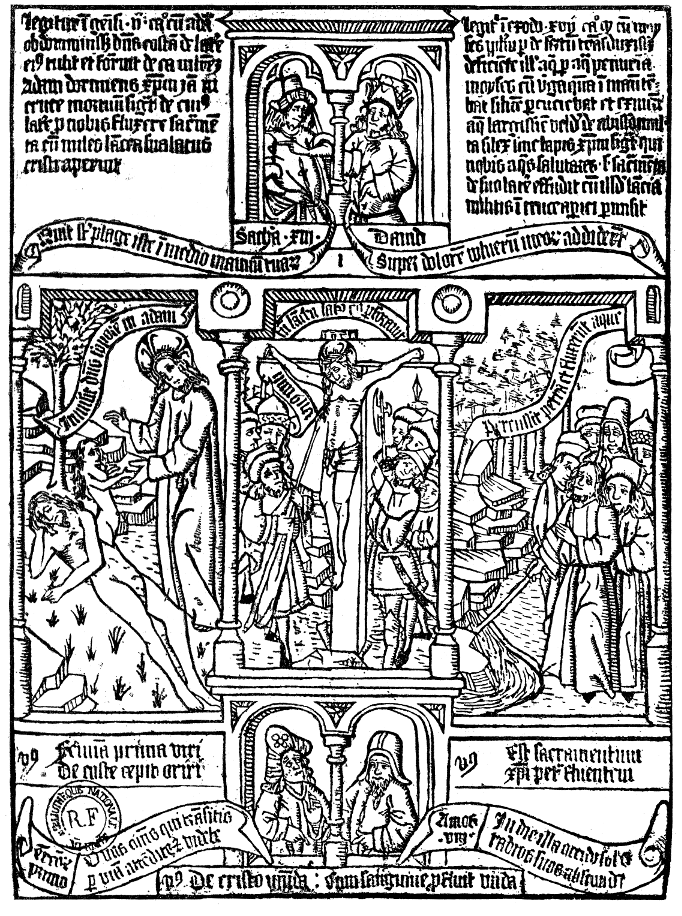
|
|
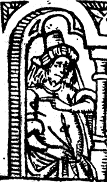
Sacharias·xiii· |
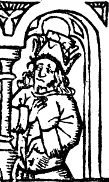
David |
|
||||
|
(Sach. 13:6) |
(Ps. 68:27) |
||||||
|
Inmisit dominus soporem in adam (Gen. 2:21) 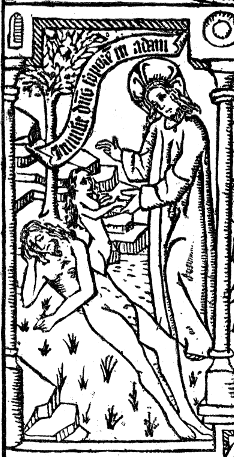
|
tum lancea latus eius perforavit Unus mili
(Joh. 19:34) 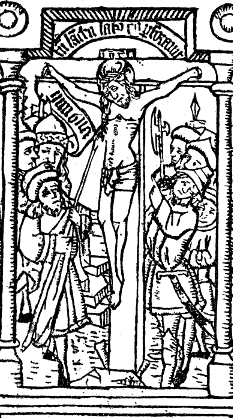
|
Percussit petram et fluxerunt aque (Ps. 77:20) 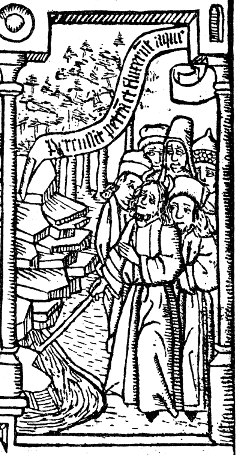
|
|||||
|
Versus de coste cepit oriri |
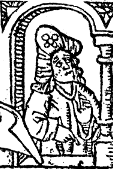
(Lament 1:12) |
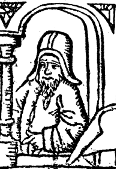
(Amos 8:9) |
Versus xpisti petra fluentum |
||||
|
Trenorum primo |
O vos omnes qui transitis per viam attendite & videte |
Amos · viij · |
In die illa occid& sol & radios suos abscund& |
||||
| Versus De cristo munda : cum sanguine profluit unda | |||||||
❦❦❦
|
|

Sakarja 13 |

David |
|
||||
|
(Sak. 13:6) |
(Ps. 68:27) |
||||||
|
Herren sände in en sömn i Adam. (1 Mos. 2:21) 
(Bilden föreställer 1 Mos. 2:21-22) |
-tär perforerade hans sida med lansen. En mili
(Joh. 19:34) 
(Bilden föreställer Joh. 19:34) |
Han slog på stenen och vatten flöt. (Ps. 77:20) 
(Bilden föreställer 2 Mos. 17:1 och 4 Mos. 20:2-11. Typologin finns i 1 Kor. 10:4) |
|||||
|
Vers uppstiga ur mannens revben. |

(Klag. 1:12) |

(Amos 8:9) |
Vers som flyter ur stenen. |
||||
|
Första klagovisorna |
O, alla ni som färdas på vägen, märk och se! |
Amos · 8 · |
Den dagen går solen ner och döljer sina strålar. |
||||
| Vers Från Kristus rent : vatten framflöt med blodet. | |||||||
❦❦❦
|
|

Zechariah 13 |

David |
|
||||
|
(Zech. 13:6) |
(Ps. 68:27) |
||||||
|
The Lord sent sleep into Adam. (Gen. 2:21) 
(The image represents Gen. 2:21-22) |
-er perforated his side with a spear. A soldi
(John 19:34) 
(The image represents John 19:34) |
He beat on the stone and waters flowed. (Ps. 77:20) 
(The image represents Exod. 17:1 and Numb. 20:2-11. The typology is from 1 Cor. 10:4) |
|||||
|
Verse to rise from the man's rib. |

(Lament. 1:12) |

(Amos 8:9) |
Verse of Christ flowing from the stone. |
||||
|
First lamentations |
O, all you who travel on the way, attend and see! |
Amos · 8 · |
In that day the sun goes down and hides its rays. |
||||
| Verse From Christ pure : water flowed forth with blood. | |||||||
|
LÅNGFREDAGSHYMN (Venantius Fortunatus, 500-tal) |
GOOD FRIDAY HYMN (Venantius Fortunatus, 6th century) |
|
De parentis protoplasti fraude Factor condolens Quando pomi noxialis morte morsu corruit: Ipse lignum tunc notavit, damna ligni ut solveret. |
Över den den först skapade förälderns1 svek bedrövades Skaparen då med det fördärvliga äpplets tugga den störtade till döden. Då noterade han detta träd för att det skulle lösa trädets skulder2. |
At the first created parent's1 fraud, the Creator greived when with the noxious apple's bite it plunged into death. Then he noted this tree so that it would solve the tree's debt2. |
|
Hoc opus nostræ salutis ordo depoposcerat: Multiformis proditoris arte ut artem falleret: Et medelam ferret inde, hostis unde læserat. |
Detta verk har vår frälsnings ordning fordrat: Den månggestaltade förrädarens list skulle gäckas med list och skänka ett botemedel av det varmed fienden hade skadat3. |
This work our salvation's order has required: The multiformed traitor's art should fail through art and bring cure with that which the enemy had harmed3. |
|
Crux fidelis, inter omnes arbor una nobilis: Nulla talem silva profert, fronde, flore, germine. Dulce lignum, dulce clavo, dulce pondus sustinens. |
Trogna kors, bland alla träd unikt förnämt: Ingen skog frambär sådan grönska, blomma, frö. Ljuva trä, med ljuv spik bärande ljuv börda. |
Faithful cross, among all the one noble tree: no forest brings forth such foliage, flower, seed. Sweet wood, with sweet nail carrying sweet burden. |
|
Flecte ramos, arbor alta, tensa laxa viscera, Et rigor lentescat ille, quem dedit nativitas: Ut superni membra Regis miti tendas stipite. |
Böj grenarna, höga träd, slappna av dina spända muskler, och låt den stelhet mjukna, som du fått av födseln, så att den högste Konungens lemmar du milt kan sträcka ut på stammen. |
Bend your branches, high tree, relax your tense muscles, and let that stiffness soften, that you got from birth, so that the limbs of the highest King |
| 1). Adam. | 1). Adam. |
| 2). Detta är en typologi eller prefiguration (ej att förväxla med “förebådande”), vilket innebär att två skilda saker eller fakta är av samma typ, och att det är någon form av identitet mellan dem, eller att den ena är en figur, en bild, som står för en annan (betecknar är det ord som används i Biblia Pauperum). De två träden i Edens lustgård är på sätt och vis i själva verket samma träd, Livets träd är dessutom korset, och frukten som hänger från Livets träd är Kristi kropp. De två träden står också för det gamla och det nya förbundet, Lagen resp Nåden osv. | 2). This is a typology or prefiguration (not to be confused with “foreboding”), which means that two different things or facts are of the same type, and that there is some sort of identity between them, or that one is a figure, an image, standing for the other (signifies is the word used in Biblia Pauperum). The two trees in the Garden of Eden are in a way actually the same tree, the Tree of Life is also the cross, and the fruit from the Tree of Life is the Body of Christ. The two trees represent the old and the new covenant, Law and Grace &c. |
| 3). Besläktad med typologin, dvs att likadana saker hör ihop, är uppfattningen att lika botar lika, något som sedermera fick en folklig motsvarighet i Paracelsus signaturlära. | 3). Related to typology, i.e. that similar things are connected together, is the opinion that like cures like, something that got a popular equivalent in Paracelsus' Doctrine of Signatures. |
| PÅSKRONDELLUS | EASTER RONDELLUS |
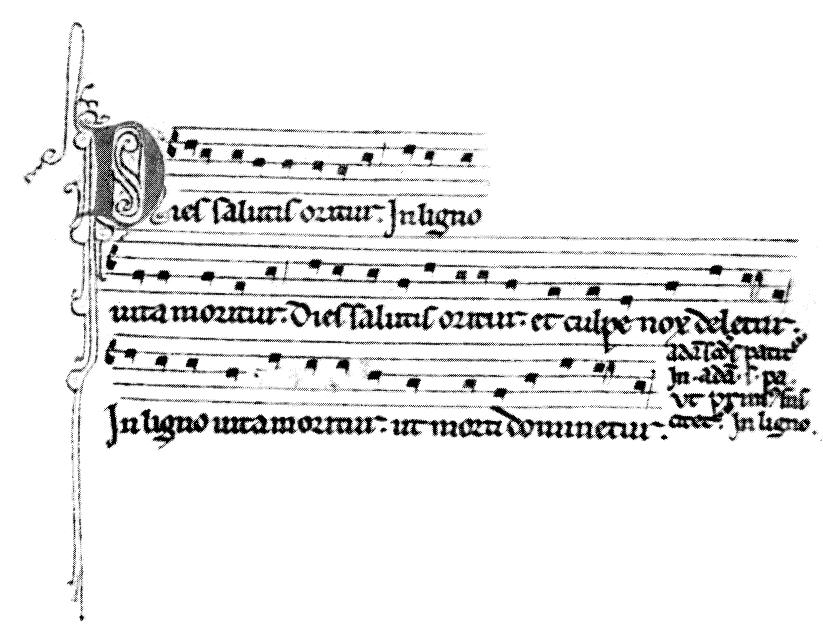
|
Dies salutis oritur. Dies salutis oritur. et culpe nox deletur. |
Frälsningens dag1 börjar, Frälsningens dag börjar, och syndens natt2 utraderas. |
The day of salvation1 begins, The day of salvation begins, and sin's night2 is deleted. |
|
Adam secundus patitur Adam secundus patitur Ut primus suscitetur |
Den andre Adam lider, Den andre Adam lider, för att den förste skall uppväckas3. |
The second adam suffers, The second adam suffers, so that the first shall be awakened3. |
| 1). 2 Kor. 6:2, syftar på Jes. 49:8, och tolkar detta som tiden efter Kristus. | 1). 2 Cor. 6:2 refers to Is. 49:8, and interprets it as the time after Christ. |
| 2). Den vi befunnit oss i mellan syndafallet och Kristi uppståndelse. | 2). The time we have been in between the Fall of Man and Resurrection of Christ. |
| 3). Jfr Rom. 5:14b; 1 Kor. 15:22, 45. | 3). Cf. Rom. 5:14b; 1 Cor. 15:22, 45. |
| UR EXSULTET, SÅNGEN TILL PÅSKLJUSET | FROM EXULTET, THE SONG TO THE PASCHAL CANDLE |
|
O mira circa nos tuæ pietatis dignatio! |
O, underbar över oss är din nåds värdighet. |
Oh1, wonderful about us is your piety's dignity! |
|
O inæstimabilis dilectio caritatis: ut servum redimeres, Filium tradidisti! |
O, ofattbar är din omsorgs kärlek: för att återköpa tjänaren gav du din Son i utbyte! |
to redeem the servant you surrendered the Son! |
|
O certe neccessarium Adæ peccatum, quod Christi morte deletum est! |
O, absolut nödvändig var Adams synd som genom Kristi död utplånats! |
Oh, certainly necessary was Adam's sin |
|
O felix culpa, quæ talem ac tantum meruit habere redemptorem! |
O, lyckobringade skuld, som förtjänade att ha en sådan och så stor frälsare! |
O, fortunate fall, that merited to have such, and so great a redeemer! |
|
O vere beata nox, quæ sola meruit scire tempus et horam, in qua Christus ab inferis resurrexit! |
O, i sanning saliga natt som ensam förtjänade att få veta tiden och stunden i vilken Kristus återuppstod från dödsriket! |
O, truly blessed night, that was solely merited to know the time and hour in which Christ resurrected from hell! |
|
O vere beata nox, in qua terrenis cælestia, humanis divina iunguntur! |
O, i sanning saliga natt i vilken jordiskt och himmelskt, mänskligt och gudomligt förenas! |
O, truly blessed night, in which earthly and heavenly, human and divine are joined! |
|
Oramus ergo te, Domine, ut cereus iste in honorem tui nominis consecratus ad noctis huius caliginem destruendam, indeficiens perseveret. |
Sålunda ber vi dig, Herre, att detta ljus, som till ditt namns ära är helgat för att denna natts mörker skall nedrivas, skall outtröttligt framhärda, |
Therefore we pray to you, Lord, that this candle, which in honor of your name is consecrated so that the darkness of this night will be destructed, shall unfailingly persevere, |
|
Et in odorem suavitatis acceptus, supernis luminaribus misceatur. |
och i doften av ljuvhet tas emot, och blandas med det högstas ljus. |
and in the odor of sweetness be accepted mixed with the lights of the highest. |
|
Flammas eius lucifer2 matutinus inveniat. |
Dess flamma, låt morgonens ljusbärare2 finna den, |
Its flame, let Lucifer2 in the morning find it, |
|
Ille, inquam, lucifer, qui nescit occasum: Christus, filius tuus, qui regressus ab inferis, humano generi serenus illuxit, et tecum vivit et regnat in sæcula sæculorum. |
denne, säger jag, ljusbärare, som inte kan dö: Kristus, din Son, som, återkommen från dödsriket, mild upplyser människosläktet, och med dig lever och regerar i evigheters evighet. |
this, I say, Lucifer, who can't die: Christ, your son, who, returned from hell, serene enlightens the human race and with you lives and reigns in ages’s ages. |
|
Amen. |
Amen. |
Amen. |
| 1). In english, there is a difference between O (vocative) and oh (an interjection)3, 4, 5,. Out of these six O's, the first two are interjections, since God is addressed, but the object, the dignity and the love, are referred to. The third one could be an interjection, “Oh, Adam's sin was necessary”, but it could also be a vocative, “O, you sin of Adam, you that were absolutely necessary”. In the last three O's it is more clear that the sin and the night are directly addressed. | |
| 2). Bilden av Kristus som “lucifer” finns i 2 Petr. 1:19 (I Upp. 2:28 och 22:16 kallas han däremot “stella matutina”, morgonstjärnan, vilket betyder samma sak). Mer info. | 2). The image of Christ as Lucifer is in 2 Petr. 1:19 (in Rev. 2:28 and 22:16 he is called stella matutina, “morning star”, which means the same thing). |
|
|
|
| Till mässans evangelieläsning sjungs Alleluia med en vers (i detta fall Romarbrevet 6:9) som syftar på temat för respektive dags mässa. I versen har ordet mors, “döden”, en melism, en liten melodi, som sjungs på denna stavelse. På denna melism finns en motett, där Perotinus först gjort tre överstämmor, och Philip Kanslern sedan texten till dessa. Det är alltså tre överstämmor med varsin text som sjungs samtidigt, medan understämman sjunger ordet mors till den ursprungliga gregorianska melodin. | To the reading of gospel in the mass, Alleluia is sung, with a verse (in this case Romans 6:9) that refers to the theme for each mass respectively. In this verse, the word mors, “death”, has a melism, a little melody, that is being sung on this syllable. Over this melism, there is a motet, where Perotin has written three parts, and Philip the Chancellor subsequently the text to these parts. There is, in other words, three voices that each has a different text being sung simultaneously, while the tenor part sings the word mors to its original gregorian melody. |
| De tre överstämmornas texter representerar olika syn på döden, så som den kommit in i världen genom syndafallet: från en övervägande negativ, i Mors que stimulo, via en “slutet gott allting gott” i Mors morsu nata venenato, till att syndafallet - som det ser ut - skedde på Guds befallning, i Mors a primi patris vicio. Och varför inte? Om syndafallet skedde enligt en förutbestämd plan, och var absolut nödvändigt och lyckobringande så är väl det den logiska slutsatsen. | The texts of the three upper parts represent the different views of death, in the form it has entered the world through the fall of man: from a dominantely negative, in Mors que stimulo, via “All's well that ends well” in Mors morsu nata venenato, to the wiev that the fall of man - as it seems - took place on God's command, in Mors a primi patris vicio. And why not? If the fall of man was according to a predetermined plan, and was absolutely necessary and fortunate, that should be the logical conclusion. |
| Slutligen förenas alla stämmor i den gregorianska melodins fortsättning längst ner, och så är sången slut. | Finally, all voices join in the completion of the gregorian melody at the bottom, and the song is finished. |
|
Alleluia. Alleluia. Christus resurgens ex mortuis iam non moritur. Mors... |
Lovprisa Herren. Lovprisa Herren. Kristus, som uppstått från de döda, skall inte mer dö. Döden ... |
Praise the Lord. Praise the Lord. Christ, resurrected from the dead, Death... |
|
| ||
|
Mors a primi patris vicio con transgressio iussu dei facta fuit emeruit o mors a ligno que triumphaveras cum seductio a demonis ore mortifero primo procreato · o mors que moriente superas gentium omnium domino cruce locato desolaris relevato a patibulo celestis domini filio · o quanta surrectio quia populo contristato in penis inferi cruciato arcato prostrato ligato mortis ex palato viru pessimo ob hoc proprio dei filio psallat tam pio nostra concio. |
Döden – från förste faderns fel när överträdelsen blev gjord på Guds befallning – har tjänat ut, O!, Döden på trä, du som hade triumferat i och med förförelsen (från demonens dödsbringande mun) av den först skapade, O!, Död, du som höjer dig - genom den döende herren över alla folk, uppsatt på korset - överges, när han lyftes från korsets tvärslå, den himmelske herrens son. Å, vilken uppståndelse! Därför, åt folket, bedrövat, i underjordens pinor korsfäst, lagt i kista, nedstörtat, bundet, av dödens smak, det sämsta gift, pga detta, till den egne Guds son sjunger vår mycket fromma grupp. |
Death — from the first father's vice when the transgression whas made on God's command — has served out, O!, Death on wood, you who had triumphed with the seduction (from the demon's death-bringing mouth) of the first created, O!, Death, lord over all peoples, located on the cross — are being desolated, when he is lifted from the crossbar, the heavenly Lord's Son. Oh, what a surrection! Therefore, to the people, saddened, in the pains of hell crucified, put in a coffin, prostrated, bound, by the taste of death, the worst poison, because of this, to the own God's Son sings our most pious group. |
|
| ||
|
Mors morsu nata venenato mors tu palato heseras viciato mors peccato primo derivato ex vicio venis avito fonte fellito fit corruptio ex abscincio1 translato sed veneno cum radio sereno exsiccato fit reformatio · vero sole nato verbis humanato passo sub pilato dolo iude vendito crucis morti tractato mortis morsu perdito vite statu reddito. |
Död, född av förgiftat bett, Död, du hade hängt kvar vid fördärvad smak, Död, av första synden härledd från nedärvt fel kommer du från förgiftad källa blir korruption av malört överflyttad men när det förgiftade av den klara strålen hade torkats skedde en omgestaltning av den sanna solen, född, ord som blivit människa, pinad under Pilatus, med avsikt såld av Judas, dragen till korsets död, förgjord av dödens bett, återgiven livets ställning. |
Death, born by poisoned bite, Death, you had adhered by damaged taste, Death, from the first sin derived from ancestral fault you come from poisoned source will become corruption from wormwood transferred but when the poisoned by the serene ray had been desiccated there was a reformation by the true sun born words become human suffered under Pilate with intent sold by Judas dragged to the death of the cross perished by the bite of death restored the state of life. |
|
| ||
|
Mors que stimulo nos urges emulo1 importuno trahis uno omnes vinculo. dum te vito mors ades subito, invito mors quam paveo, caveo quam fugio, non effugio serpis clanculo dissoluto iugi loculo dum insignito dives titulo · flores seculo vite finito hoc curriculo inanito demolito hoc corpusculo dissoluto teste fragilis luto parvulo claudis angulo brevi titulo2 mors gladio exuto instans iugulo vivam ut in tuto me signaculo crucis munio christi scuto o mors |
Död, du som driver på oss med tävlingshetsande1 piskspö, med ett enda tyranniskt koppel drar du alla. När jag försöker undvika dig, Död, är du genast här mot min vilja. Död, som jag är rädd för, aktar mig för, som jag flyr från, kan jag inte undfly. Du slingrar dig fram i hemlighet, förbunden med rutten likkista. Medan den rike är prydd med titlar blomstrar du i tiden; Med detta livets lopp avslutat, tömt, demolerat, denna lilla kropp upplöst, som den förgängliga dyn omvittnar, stänger du in oss i ett litet hörn med en kort titel.2 När döden med svärdet draget på ett ögonblick är mot min strupe skall jag leva skyddad när jag försvarar mig med korsets tecken, med Kristi sköld. Å! Döden ... |
Death, with a pressing1 prod you urge us, you drag us all with one cruel chain. When I avoid you, Death, you whom I fear, I beware, whom I flee, I cannot escape. You crawl with the stealthy dissolute yoke's coffin. While the rich man is distinguished with titles you flourish in time. With the race of this life finished, emptied, demolished, this little body dissolved, as witnessed by perishable mud, you confine us in a small corner with a short title.2 |
|
| ||
|
...illi ultra non dominabitur. Alleluia. |
...ska inte dominera honom längre. Alleluia. |
|
| 1) Det är alltså en sådan här det är fråga om, vad det nu kan heta på svenska: (goad), (prod) | 1). Æmulus (eng. emulating), cognate with image and imitate, is an adjective meaning “striving - or trying or wanting - to imitate or equal (or, in a transferred sense, to excel)”, or, in a transferred sense, “rivaling, envious, jealous” (link), or, as in this case, “making you want to strive to try to … excel or rival, or being jealous or envious”. The meaning is that Death is always chasing you, always reducing the distance between her and you, always goading or prodding you with a goad or prod to make you run faster, and at the end of - and as the prize of - this Death Race (where everyone is a winner!) is ... Death! The translation “pressing prod” (or “spiteful spur” or “greedy goad”) refers to this, although it doesn't quite capture its essence. |
| 2) Som i en liten kista under en liten gravsten, eller i ett kolumbarium under en liten skylt med ens namn på. | 2) Like in a little coffin under a little tombstone, or in a columbarium under a little sign with your name on. |